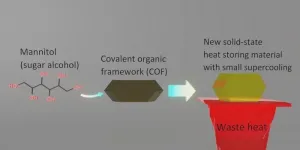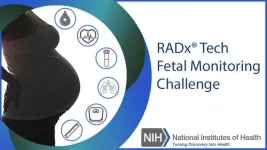(Press-News.org) New research provides insight about the bedrock scientific principle that mitochondrial DNA — the distinct genetic code embedded in the organelle that serves as the powerplant of every cell in the body — is exclusively passed down by the mother.
The study, a collaboration among Oregon Health & Science University and other institutions, published today in the journal Nature Genetics.
Scientists have long recognized the fact that mitochondrial DNA, or mtDNA, comes exclusively from egg cells in humans, meaning only the mother contributes the genetic code carried by thousands of mitochondria necessary for energy production in every cell in the body.
Previously, it was believed that paternal mtDNA was eliminated soon after a sperm fuses with an oocyte, or developing egg, during fertilization, possibly through an immune-like search-and-destroy response.
However, the study found that while mature sperm do carry a small number of mitochondria, they lack intact mtDNA.
“We found that each sperm cell does bring 100 or so mitochondria as organelles when it fertilizes an egg, but there is no mtDNA in them,” said co-author Shoukhrat Mitalipov, Ph.D., director of the Center for Embryonic Cell and Gene Therapy at OHSU.
Researchers found that sperm cells are not only devoid of intact mtDNA, but they also lacked a protein essential for mtDNA maintenance, known as mitochondrial transcription factor A, or TFAM.
Scientists aren’t sure why sperm are not allowed to contribute mtDNA, but Mitalipov theorizes that it may relate to the fact that a sperm uses a lot of mitochondrial energy in its biological impetus to fertilize an egg. It would thus accumulate mutations in mtDNA. The developing eggs known as oocytes, by contrast, draw energy primarily from surrounding cells, not from their own mitochondria, so maintain relatively pristine mtDNA.
“Eggs pass on really good mtDNA at least partly because they don’t use mitochondria as a source of energy,” Mitalipov said.
The 100 or so organelles in sperm are swamped by hundreds of thousands of mitochondria embedded in each egg cell — each carrying the 37 genes in mitochondrial DNA. The contribution of only maternal mtDNA is believed to confer an evolutionary advantage by limiting the risk of accumulations of mtDNA mutations that cause disease in offspring.
Mitochondria control respiration and energy production within every cell of the body, so mutations in mtDNA can cause a range of potentially fatal disorders affecting organs with high-energy demands, such as the heart, muscle and brain.
To help mothers prevent passing on known mtDNA disorders to their children, Mitalipov pioneered a method called mitochondrial replacement therapy to replace mutant mtDNA through in vitro fertilization using healthy mtDNA from donor eggs.
Congress has prevented the Food and Drug Administration from overseeing clinical trials using the procedure in the U.S., so clinical trials are instead being conducted overseas, including clinical trials in the United Kingdom to prevent disease and in Greece to treat infertility.
Researchers write that the new discovery has important implications for human fertility and germ cell therapy.
“Understanding the role of TFAM during sperm maturation and its function during fertilization may hold keys to our ability to treat certain infertility disorders, and increase the efficiency of assisted reproductive technologies,” said corresponding author Dmitry Temiakov, Ph.D., a molecular biologist with Thomas Jefferson University in Philadelphia.
In addition to Mitalipov and Temiakov, co-authors include William Lee, Angelica Zamudio-Ochoa, Gina Buchel and Li Li of Thomas Jefferson University; Petar Podlesniy, Margalida Puigros, Anna Calderon and Ramon Trullas of the Institute of Biomedical Research of Barcelona; Nuria Marti Gutierrez, Aleksei Mikhalchenko and Amy Koski of OHSU; and Hsin-Yao Tang of The Wistar Institute of Philadelphia.
Studies conducted at Oregon Health & Science University were supported by OHSU institutional funds.
END
Mature sperm lack intact mitochondrial DNA, study finds
New research provides insight about the reason mitochondria — the powerhouse of the cell — pass only from the mother
2023-09-18
ELSE PRESS RELEASES FROM THIS DATE:
Research identifies new potential hurdle for nano-based therapies
2023-09-18
HOUSTON ― Researchers at The University of Texas MD Anderson Cancer Center have discovered that certain nano-based cancer therapies may be less effective in younger patients, highlighting the need for further investigation into the impact of aging on the body’s ability to respond to treatment.
The researchers found age-related differences are due to how effectively the liver filters the bloodstream. Younger livers are more efficient at this process, which helps limit toxins in the blood but also filters out beneficial treatments, potentially rendering them ineffective.
The study, published today in ...
Improving the properties of sweeteners for enhanced thermal energy storage
2023-09-18
As we seek more efficient utilization of waste thermal energy, use of “phase change materials (PCMs)” is a good option. PCMs have a large latent heat capacity and the ability to store-and-release heat as they change from one state of matter to another. Among many PCMs, sugar alcohols (SAs), a class of organic compounds commonly used as sweeteners, stand out due to their low cost, non-toxic, non-corrosive, and biodegradable nature. In particular, SAs generally have their melting point in 100–200 °C, which is an important temperature range where a huge amount of waste heat exists but is currently ...
Ohio State leads new global climate center on AI for biodiversity change
2023-09-18
COLUMBUS, Ohio – The Ohio State University will lead a new multimillion dollar international center devoted to using artificial intelligence to help understand climate impacts on biodiversity.
The AI and Biodiversity Change (ABC) Global Climate Center will bring together ecologists and computer scientists from six universities in the United States and Canada, with partners in UK, Europe, and Australia, to develop new AI-enabled, data-supported approaches to study how changes in climate are impacting life – including animals, plants and insects – on Earth.
$5 ...
Ohio State researchers publish national guidelines for ALS genetic testing, counseling
2023-09-18
COLUMBUS, Ohio – Researchers at The Ohio State University Wexner Medical Center and College of Medicine led the creation of evidence-based consensus guidelines for genetic testing and counseling for patients with amyotrophic lateral sclerosis (ALS), a neurodegenerative disease that affects the cells in the brain and spine.
These evidence-based, consensus guidelines provide clinicians with a framework for the offer of genetic testing and outline the information that should be provided to persons with ALS before and after testing. In addition, the guidelines provide specific recommendations regarding ...
Study: Admissions policies that consider grades and test scores in context of available opportunities are linked to college success
2023-09-18
Indicators of high school grades and standardized test scores that take into account the levels of school, neighborhood, and family resources available to students are strongly associated with those students’ success in college, according to new research published today. The study, published in AERA Open, a peer-reviewed journal of the American Educational Research Association, emerges against the backdrop of the recent Supreme Court decision to ban race-conscious admissions in higher ...
Unlocking urban diversity: The magnetism of complex amenities
2023-09-18
Diversity fuels prosperity in cities, but where do people from diverse backgrounds meet? A study from the Complexity Science Hub now indicates that locations offering a range of rare shops and services may hold the key.
Extensive research consistently underscores a common factor in successful cities: diversity. Encouraging interactions between individuals of different backgrounds fosters the exchange of ideas, leading to innovation and economic success. “However, segregation persists in urban ...
Latest blood cancer treatment updates presented at annual NCCN event during Blood Cancer Awareness Month
2023-09-18
SAN FRANCISCO, CA [September 18, 2023] — The National Comprehensive Cancer Network® (NCCN®) 2023 Annual Congress: Hematologic Malignancies™ returns to San Francisco this week, for the first time since 2019. The meeting features insights from world-renowned experts on providing optimal, evidence-based treatment for various blood cancers, plus best practices for protecting vulnerable populations in a changing healthcare landscape.
The live event is taking place September 22-23, 2023, at the Hilton San Francisco Union Square. ...
How do suicide risk or depression screenings compare to identify patients at risk?
2023-09-18
Editor’s Note: September is National Suicide Prevention Month.
COLUMBUS, Ohio – Research led by The Ohio State University Wexner Medical Center and Wesleyan University found that depression screening tools outperformed suicide risk screenings under most conditions.
“We compared the effectiveness of multiple depression and suicide risk screening methods for the purpose of identifying primary care patients who subsequently attempted suicide. Our findings may generate a lot of discussion within the suicide prevention community, as it contradicts long-held assumptions ...
Atomic layer deposition route to scalable, electronic-grade van der Waals Te thin films
2023-09-18
A research team, led by Professor Joonki Suh in the Department of Materials Science and Engineering and the Graduate School of Semiconductor Materials and Devices Engineering at UNIST, has made a significant breakthrough in thin film deposition technology. By employing an innovative atomic layer deposition (ALD) process, Professor Seo successfully achieved regular arrangement of tellurium (Te) atoms at low temperatures as low as 50 degrees Celsius.
The ALD method is a cutting-edge thin film process that enables precise stacking ...
NIH launches $2 million prize competition to spur innovation in fetal diagnostic and monitoring technologies
2023-09-18
The National Institutes of Health will award up to $2 million in cash prizes to accelerate development of diagnostic and monitoring technologies that improve fetal health outcomes in low-resource settings. The Rapid Acceleration of Diagnostics Technology (RADx® Tech) Fetal Monitoring Challenge calls on scientists, engineers, and clinicians around the country to submit their innovative approaches and compete for prizes and additional resources to support technology development and clinical impact. The challenge is sponsored by the NIH’s National Institute of Biomedical Imaging and Bioengineering (NIBIB), ...
LAST 30 PRESS RELEASES:
Fund for Science and Technology awards $15 million to Scripps Oceanography
New NIH grant advances Lupus protein research
New farm-scale biochar system could cut agricultural emissions by 75 percent while removing carbon from the atmosphere
From herbal waste to high performance clean water material: Turning traditional medicine residues into powerful biochar
New sulfur-iron biochar shows powerful ability to lock up arsenic and cadmium in contaminated soils
AI-driven chart review accurately identifies potential rare disease trial participants in new study
Paleontologist Stephen Chester and colleagues reveal new clues about early primate evolution
UF research finds a gentler way to treat aggressive gum disease
Strong alcohol policy could reduce cancer in Canada
Air pollution from wildfires linked to higher rate of stroke
Tiny flows, big insights: microfluidics system boosts super-resolution microscopy
Pennington Biomedical researcher publishes editorial in leading American Heart Association journal
New tool reveals the secrets of HIV-infected cells
HMH scientists calculate breathing-brain wave rhythms in deepest sleep
Electron microscopy shows ‘mouse bite’ defects in semiconductors
Ochsner Children's CEO joins Make-A-Wish Board
Research spotlight: Exploring the neural basis of visual imagination
Wildlife imaging shows that AI models aren’t as smart as we think
Prolonged drought linked to instability in key nitrogen-cycling microbes in Connecticut salt marsh
Self-cleaning fuel cells? Researchers reveal steam-powered fix for ‘sulfur poisoning’
Bacteria found in mouth and gut may help protect against severe peanut allergic reactions
Ultra-processed foods in preschool years associated with behavioural difficulties in childhood
A fanged frog long thought to be one species is revealing itself to be several
Weill Cornell Medicine selected for Prostate Cancer Foundation Challenge Award
Largest high-precision 3D facial database built in China, enabling more lifelike digital humans
SwRI upgrades facilities to expand subsurface safety valve testing to new application
Iron deficiency blocks the growth of young pancreatic cells
Selective forest thinning in the eastern Cascades supports both snowpack and wildfire resilience
A sea of light: HETDEX astronomers reveal hidden structures in the young universe
Some young gamers may be at higher risk of mental health problems, but family and school support can help
[Press-News.org] Mature sperm lack intact mitochondrial DNA, study findsNew research provides insight about the reason mitochondria — the powerhouse of the cell — pass only from the mother




